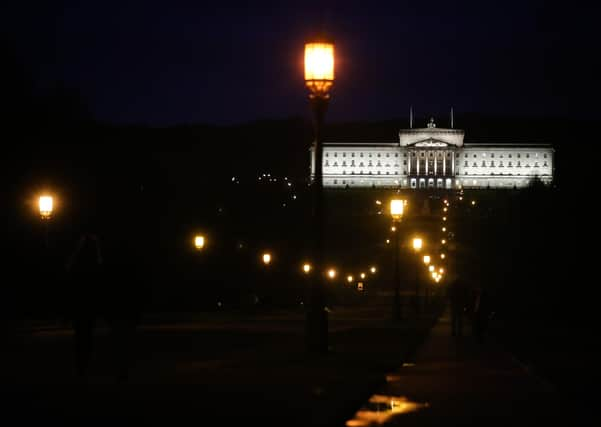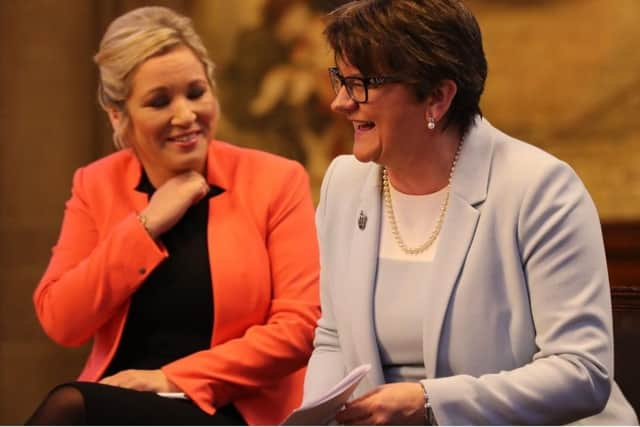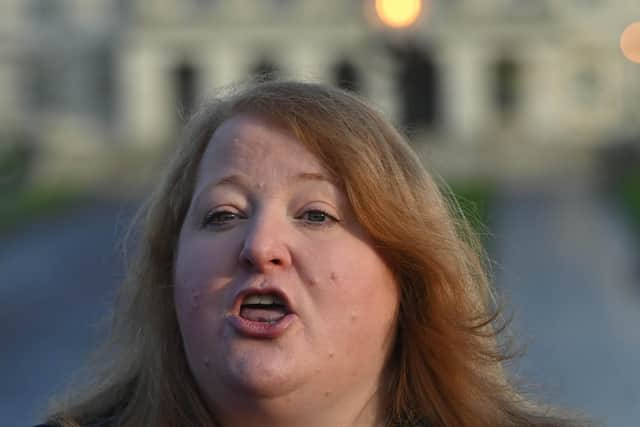Sam McBride: Things fall apart: Stormont’s dark week reveals melancholic truth even its spin cannot hide


Announcing the start of the circuit-breaker restrictions a month ago, Arlene Foster was asked for her exit strategy. Speaking emphatically, the first minister said: “It’s important to say – and I told this to the hospitality sector; I spoke with them yesterday: This is for four weeks. So on 13 November, people will be back working again; I think it’s important that they have that certainty.”
Insofar as there was any strategic thought behind that comment, it was founded on her knowledge that the DUP had ensured that the law enacting the restrictions had been written in a way which meant they automatically expired after four weeks.
Advertisement
Hide AdAdvertisement
Hide AdBut to take that fact and translate it into a public vow of “certainty” was injudiciously simplistic. That pledge allowed no scope for where case numbers, deaths or hospital capacity would be.


By proposing the restrictions in the first place, Mrs Foster had accepted that, she had no other means of suppressing the virus. In those circumstances it would not only be morally unconscionable, but would be politically calamitous for any politician to press ahead with abandoning the only means of lifting pressure on medics if hospitals were being overrun merely to meet an arbitrary deadline of their making.
But Mrs Foster is a leader at the mercy of her party and she knew that many of her key colleagues are admirers of Donald Trump and share his belief that the ‘cure’ of lockdown is worse than the disease. Before the restrictions had even made it into law they had been denounced by her likely successor as first minister, Edwin Poots.
Thus, from the top of Stormont there was an expectation given both to business and to DUP members that after four weeks the restrictions would end – regardless of circumstance. The DUP leader was always going to struggle to meet the expectation she had created.
Advertisement
Hide AdAdvertisement
Hide AdBut ministers had a month in which to come up with a plan which would allow for various eventualities. They could have taken a metric such as hospital bed occupancy (currently at 101%) or case numbers and used that to set out when each restriction would be lifted or imposed. Inexplicably, this work was left until last week – and even then it was not a strategic plan for the months ahead but a desperate attempt to deal with the next two weeks.


That is in keeping with how the DUP and Sinn Féin govern. In the summer, they left it to the last moment to advertise for the head of the civil service’s replacement – despite knowing for six months that he was retiring. They then rejected all the candidates, leaving the civil service leaderless.
That past failure probably exacerbated this crisis. By failing to appoint the head of the civil service, Stormont’s leaders deprived themselves of a crucial adviser who traditionally acts as a glorified fixer when they are in dispute.
Eventually, in the middle of last week Health Minister Robin Swann submitted a proposal to extend the restrictions by two weeks, a view which reflected the advice of Chief Medical Officer Michael McBride. Outside Stormont, medical opinion was even more outspoken with the BMA saying that relaxing the rules would be “a deliberate, destructive act” and calling for restrictions to be tightened, not loosened.
Advertisement
Hide AdAdvertisement
Hide AdGiven Mrs Foster’s pledge and her party’s aversion to restrictions, that was always going to be unpalatable to the DUP, which kicked back firmly. But it is Sinn Féin’s position which then became curious.
At last Thursday’s weekly Executive (the fact the Executive was not holding emergency meetings was itself indicative of its sluggish approach), Mrs Foster and Michelle O’Neill – who call the Executive’s meetings and set its agenda – decided that there would not be a vote on the health minister’s proposal. Instead, a discussion moved in predictable circles, with another day lost. Then Sinn Féin worked behind the scenes with the DUP, largely out of sight of the other parties, to create a separate plan.
I have been told by one source with knowledge of what went on that Sinn Féin actually committed the plan to writing, although it only seems to have gone to the DUP inner circle.
On Saturday afternoon, Ms O’Neill phoned Arlene Foster and told her that she would the following day use an interview on the BBC’s Sunday Politics to reveal aspects of the plan, setting out areas in which restrictions may be lifted and floating the idea of allowing restaurants to open but banning them from serving alcohol.
Advertisement
Hide AdAdvertisement
Hide AdMrs Foster told Ms O’Neill not to do that – but the deputy First Minister went ahead anyway. I was in the studio as she was interviewed and it was clear that this was a planned revelation – she did not stumble into or get pressed into revealing it; she volunteered the detail readily.
And that is baffling. Knowing the DUP leader’s difficulty in keeping her party on board with even partially extending restrictions, what could Ms O’Neill’s possible motivation have been for revealing that plan after being expressly asked not to do so by her partner in government?
Puzzlingly, giving the previous day’s phone call, when asked if she and Mrs Foster were 100% speaking with one voice, she said “yes”, before stating unequivocally “we will have a joint Executive agreement tomorrow”.
Yet Sinn Féin has now admitted that Ms O’Neill – who knew that she was going against the chief medical officer – had no medical or scientific data to back up her plan. When that data was asked for the following morning, unsurprisingly – given the existing medical advice – it was negative
Advertisement
Hide AdAdvertisement
Hide AdAnd extraordinarily the people who the plan was meant to benefit – the hospitality industry – had not been brought on board. They denounced it as evidence of ministers’ ignorance of alcohol’s importance to their business model. Thus several days had been wasted on a plan which pleased no one.
The DUP see in this the hand of southern Sinn Féin intervening to stop Ms O’Neill doing something which would ease restrictions in the north as they remained tough in the south. There is some logic in that, given the party’s desire for all-island harmonisation. Yet it is difficult to believe that Ms O’Neill could have revealed the plan on TV against the first minister’s wishes without authorisation from the party. What really lay behind Sunday’s interview remains a mystery.
Mrs Foster has said that when she left home on Monday morning, she still expected the Executive to approve the plan. But that morning she faced open revolt from her own party, with Ian Paisley Jr denouncing the plan on the Nolan Show. The son of Northern Ireland’s most famous teetotaller said that asking restaurants to reopen without booze was like allowing hairdressers to reopen without their combs.
That day saw the Executive meet twice, adjourn, call a third meeting which was cancelled just as it was about to begin, before calling it at night at 9pm. By now the flaw of leaving the decision so late were obvious – Mondays and Tuesdays are sitting days for the Assembly where ministers regularly have to be in the chamber and so the Executive could not meet.
Advertisement
Hide AdAdvertisement
Hide AdOne unionist source claimed that on Monday there appeared to be strains between Ms O’Neill and party colleague Caral Ni Chuilin, while there were also more familiar strains. Ms O’Neill has taken to describing herself as the ‘joint head of government’ rather than her official title of deputy first minister and during an Executive meeting – being held virtually on Zoom – the DUP Economy Minister Diane Dodds referred sharply to the use of “changed titles” in her on-screen description.
It was in this frosty mood that DUP minister Edwin Poots threatened to call a cross-community vote – effectively deploying the DUP’s Executive veto – if the Health Minister’s proposal was put to a vote.
Yet by Tuesday morning, that was still the only proposal on the table.
With Mrs Foster now unable to enforce her will even on her own party, in the Assembly that morning senior DUP MLA Paul Frew savaged the Executive as “a farce” and said of the circuit-breaker which Mrs Foster had endorsed: “People will die because of the decision the Executive made.”
Advertisement
Hide AdAdvertisement
Hide AdAs the day wore on, it became clear that the DUP and Sinn Féin could not even agree to discuss the issue in the Executive.
Eventually a meeting began at tea time and it became apparent that Sinn Féin was now changing its position to back Mr Swann’s proposal which had been on the table for a week.
Mr Swann’s proposal was put to a vote and the DUP triggered a cross-community vote to veto it – a perfectly lawful use of the powers available to it, but a remarkable development in that the unionist party was deploying a mechanism designed to protect the communal interests of unionism or nationalism against another unionist minister.
Mrs Dodds then tabled a proposal for a gradual re-opening similar to what Ms O’Neill had revealed on Sunday, but without the rule on alcohol. That appeared to reveal DUP unease at fully ending restrictions as it had said it wanted.
Advertisement
Hide AdAdvertisement
Hide AdIt had the power to block every other proposal, thus achieving that aim, but that would have left it dangerously exposed politically if there was a medical crisis which could be traced back to it.
But an intervention by Dr McBride, warning that any easing of restrictions would lead to deaths, unsettled some ministers. Half an hour into Wednesday, ministers broke up without a decision.
Reconvening again that afternoon, Mr Swann tabled a proposal for a one-week extension of restrictions, prompting the DUP to again deploy its veto before Mrs Dodds’ proposal was defeated in a straight vote.
The DUP and Sinn Féin relationship was now so toxic that an Alliance source said that party leader Naomi Long “spent much of the day as a go-between” conveying messages between the two main parties.
Advertisement
Hide AdAdvertisement
Hide AdMrs Long then effectively merged the two defeated proposals into a compromise and put that to the Executive. But rather than sit late into the night, ministers broke up just after 8pm, to the fury of some of businesses desperate for clarity.
As the Executive’s unhasting move towards performing the basic functions of a government continued, there was a new revelation.
A lawyer had contacted me to express concern that ministers were telling the public that the existing restrictions ran out at midnight on Thursday night when he said – due to the complex intersection of two pieces of legislation and ambiguous wording – that they actually ran until midnight on Friday night.
At lunch time on Thursday the Executive confirmed that after being alerted to that problem by the News Letter its legal advice had changed and it now believed its law ran for 24 hours longer than it had thought. The idea that a government did not understand its own law made national headlines.
Advertisement
Hide AdAdvertisement
Hide AdWorn out and with its reputation shredded, the Executive finally considered a proposal from Mrs Dodds to keep the current restrictions for another week, then allow close contact services and unlicensed hospitality to open, and then in two weeks’ time allow licensed premises to open. Although not radically different from the O’Neill or Long proposal, this time a divided Executive narrowly passed her proposal with the DUP, UUP and Alliance endorsing it. The SDLP abstained while Sinn Féin voted against it – but chose not to deploy its veto.
Mrs Foster argued that she had fought to secure concessions to give more certainty to business, yet the shambolic indecision meant that even if all restrictions had been lifted today it would have been too late for many firms to plan for that.
Ms O’Neill claimed that she could not “in all good conscience” support the plan to lift some restrictions because of Dr McBride’s advice against that. Yet she had known Dr McBride’s clear advice last week that two further weeks were needed – and then spent days working on a plan to ease restrictions before then.
This has been a performance of spectacular absurdity by the entire Stormont system – not just in the Executvie, but in the Assembly which spent hours on Monday debating and voting to approve a covid law it was told had already been repealed.
Advertisement
Hide AdAdvertisement
Hide AdWords are inadequate to convey the scale of the incompetence exposed this week. This has been more than just another inglorious episode for Stormont.
In broken systems, at some point things fall apart; the centre cannot hold.
The hope of some that this pandemic would drive the disputatious lead parties in the Executive together is now forlorn. The optimism that Stormont might meaningfully reform after the RHI scandal has grown dim.
There is a melancholic truth now emerging: This is how Stormont operates under its current structures and with its current personalities. Expecting the same people operating the same system to come up with a different outcome is now in the realms of religious faith rather than empirical evidence.
Advertisement
Hide AdAdvertisement
Hide AdOne development on Thursday night emphasises how fragile this whole edifice is. Naomi Long gave an interview to the BBC in which she said that she had considered quitting the Executive over the DUP’s decision to use its veto – something which effectively renders her vote meaningless, because she is not a unionist or a nationalist.
Although that threat seemed to be a warning to the bigger parties rather than something likely to be imminently fulfilled, if Mrs Long was to quit as justice minister it would precipitate its own crisis because filling her post would be exceptionally difficult.
The only other person likely to be acceptable to the DUP and Sinn Féin – independent Claire Sugden – is likely to view the prospect of joining this Executive so late in its mandate as not just unappealing but a threat to her own chances of re-election.
The thing which might frighten the Executive parties – and the DUP and Sinn Féin are the most vulnerable – is that it might shaken out of their stupor those people who hitherto have taken no interest in politics. Suddenly politics has taken an interest in them, demonstrating that where power resides matters. They are unlikely to be attracted to the DUP or Sinn Féin after this omnishambles.
Advertisement
Hide AdAdvertisement
Hide AdJust as the roots of this week lie in a past decision to put off hard strategic choices in favour of just getting through the next crisis, so Thursday’s apparent resolution is nothing of the sort. The real strategic decision of how to handle the pandemic is still driving the DUP and Sinn Féin apart.
Almost certainly, we’ll be back here again.
——— ———
A message from the Editor:
Thank you for reading this story on our website. While I have your attention, I also have an important request to make of you.
With the coronavirus lockdown having a major impact on many of our advertisers — and consequently the revenue we receive — we are more reliant than ever on you taking out a digital subscription.
Subscribe to newsletter.co.uk and enjoy unlimited access to the best Northern Ireland and UK news and information online and on our app. With a digital subscription, you can read more than 5 articles, see fewer ads, enjoy faster load times, and get access to exclusive newsletters and content. Visit https://www.newsletter.co.uk/subscriptions now to sign up.
Advertisement
Hide AdAdvertisement
Hide AdOur journalism costs money and we rely on advertising, print and digital revenues to help to support them. By supporting us, we are able to support you in providing trusted, fact-checked content for this website.
Alistair Bushe
Editor